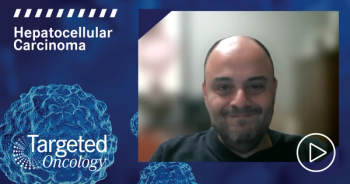
Evaluating the REFLECT Trial of Lenvatinib in Unresectable HCC
Shifting their focus to the REFLECT trial of lenvatinib in unresectable hepatocellular carcinoma, panelists consider use of tyrosine kinase inhibition in this setting.
Episodes in this series

Transcript:
Aparna Kalyan, MD: The REFLECT trial was a phase 3 trial that looked at lenvatinib and comparing it to sorafenib in frontline patients with unresectable HCC [hepatocellular carcinoma]. And we should point out that this study was designed as a noninferiority trial, essentially not trying to beat sorafenib but just to see if we could be at the same benchmark. Patients could not have received previous treatment for advanced HCC, and they were randomly assigned in a 1:1 fashion to either lenvatinib or sorafenib, the primary end point being overall survival. Lenvatinib demonstrated a median overall survival of about 13.6 months, and sorafenib had a median survival of about 12.3 months. And essentially the hazard ratio demonstrated that it was noninferior to sorafenib. Frequent adverse events seen in both drugs were hypertension, diarrhea, and some appetite changes. Perhaps the biggest one that we always see with sorafenib is the palmar-plantar erythrodysesthesia, which was significantly less in the lenvatinib arm. Dr George, do you use lenvatinib a lot given the realm that we’re in with IO [immune-oncology] therapy? I know we talked about the 15%, but are there other patients for whom you consider the TKI [tyrosine kinase inhibitor] for in the front line?
Ben George, MD: Maybe 2 or 3 different subgroups, the one that you mentioned, Dr Kalyan, where they’re not candidates for T-cell therapy for whatever reason, autoimmune conditions, or bleeding risk, or what have you. The second, like you said, people who could potentially be a candidate for transplant for whatever reason, if that small subgroup exists, and third, of course, the people who progress on frontline bevacizumab plus atezolizumab, what is the optimal second-line treatment in that patient population? In the absence of data, I have defaulted somewhat to lenvatinib in that population as well. First of all, lenvatinib, even though the data look very nice in terms of the progression-free survival [PFS] compared to sorafenib, that did not translate into an overall survival benefit. And secondly, even with that nice response rate and the PFS benefit, the drug is not super well tolerated either. I struggle with that, patients have a fair amount of asthenia and dysphonia, and overall the hypertension issues. But we can get them through it, it takes several dose modifications and adjustments and hand holding, all of the above. But certainly, it is a drug that can be tolerated, a drug that is effective, and I tend to go to that in the second line after [bevacizumab], T-cell failure. What is your pattern of use of lenvatinib, Dr Kalyan?
Aparna Kalyan, MD: I did jump on the bandwagon of lenvatinib when it first came out, but then I really struggled. I struggled with patients, with their appetite being a bigger issue than I anticipated, and as you said, the asthenia. Those adverse events were bigger than I thought they were, even though on paper, the numbers looked good. I did shy away from using lenvatinib as frontline therapy a lot. The population of patients that we talked about who are not eligible, we don’t have a choice for, we have to go down that route. I’ve leaned toward the immunotherapy option if I’m able to, and certainly if there are clinical trials, that’s a different question. But I’ve been more cautious about lenvatinib because it’s not as exciting as I thought it was going to be. The results are certainly nice that it’s noninferior, but from a tolerance perspective, what I saw on the trial is not what my patients have complained about.
Transcript edited for clarity.
























